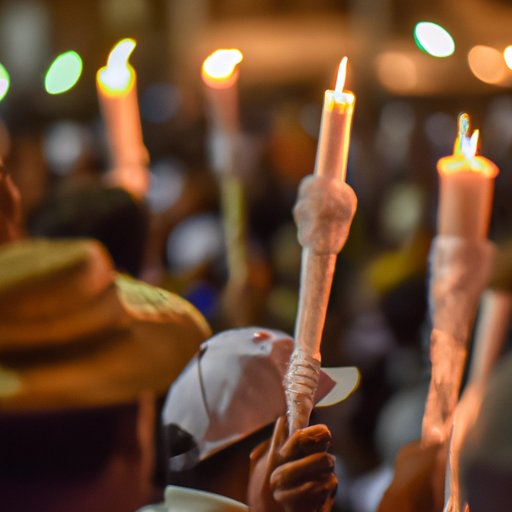Introduction
When tragedy strikes, people around the world come together to show support, love, and respect for those who were affected. One way to do this is through a vigil. In this article, we’ll explore what a vigil is, the different types of vigils, and the significance of vigil in different cultures and religions. We’ll also discuss the benefits of participating in a vigil, how organizing a vigil can bring a community together, how vigil has evolved over time, and personal stories of miracles experienced during vigils.
Defining Vigil
A vigil is a gathering of people who come together to observe a period of watchfulness. This period can last for a few hours or even several days. While vigils can vary in length and content, there are some common components to a vigil. They might include lighting candles, reading poems, singing hymns, praying, and remembering those who have passed away. Different types of vigils include religious vigils, cultural vigils, political vigils, and more.
The Importance of Vigil in Different Cultures and Religions
In many cultures and religions, vigils are an important way to honor and remember the dead. In Christianity, vigils are conducted in the presence of the deceased before a funeral or burial service. In Hinduism, the dead are mourned for 13 days, during which time a vigil is held and the family of the deceased is comforted. In Judaism, there is a period of mourning called Shiva, in which family and friends come together to sit vigil during the first seven days after a loved one’s death.
These examples show the importance of vigil in different cultures and religions. Through a vigil, people can express and share their grief, comfort each other, and remember those who have passed away. A vigil can also serve as a spiritual experience, depending on the beliefs of those gathered.
The Benefits of Participating in a Vigil
Participating in a vigil can be beneficial in many ways. Here are just a few examples:
Mental Benefits
A vigil can provide a sense of community, comfort, and support. It can be especially helpful for those who are grieving and looking for a way to connect with others who understand what they’re going through.
Physical Benefits
When people come together for a vigil, they are often standing or sitting in close proximity to one another, which can provide a sense of body warmth and safety, something that can be comforting for those in need of a physical connection.
Emotional Benefits
Vigils offer the ritual of connection, anchoring and meaning that can help participants feel a sense of closure. While the benefits of participating in a vigil can differ depending on the individual and the situation, it’s clear that a vigil can be a powerful and healing experience for those who attend.
Vigil for a Cause: How Organizing a Vigil Brings a Community Together
While vigils are often held for those who have passed away, they can also be organized for a cause or issue that needs attention. By providing a safe space for people to come together, a vigil can bring a community together and amplify the message of the cause. For example, after the Pulse nightclub shooting in Orlando, Florida, vigils were held around the world to show support for the LGBTQ community and to raise awareness about the need for gun control.
Bringing together a community for a vigil can help create a sense of unity, which can be incredibly powerful. This collective energy can be used to make positive change in the world. In many ways, a vigil is an opportunity for people to renew their commitment to the issues they care about – with the support of their fellow vigil participants.
The History and Evolution of Vigil Through the Ages
The practice of vigil has been around for thousands of years. In ancient times, vigils were held as part of religious ceremonies. Later, as Christianity spread throughout the Roman Empire, vigils became an important part of the Christian faith. Over time, the practice of vigil has evolved to include different cultures and religions. Today, vigils are held for a variety of reasons, which can range from religious observances, to political protests, to communal grief, and more.
True Stories of Miracles Experienced During Vigils Around the World
Many people who have attended a vigil can attest to the deeply spiritual and transformative experience that it can be. Some participants have even reported experiencing miracles during the course of a vigil. These stories include instances of physical healing, emotional and spiritual renewal, and more. While there is no way to know for sure if these stories are true, many people who have witnessed them believe that there is a connection between vigil and miracles.
Conclusion
In conclusion, vigils serve as a powerful way for people to come together and show support, love, and respect for those who were affected by a tragedy. Whether you’re grieving, seeking to honor a loved one, or looking to make a difference in the world, a vigil can offer a sense of community, comfort, and support in a time of need. After exploring the different aspects of vigil in this article, we encourage readers to consider attending a vigil or organizing one themselves. By doing so, they can help bring their community together and make a positive impact on the world.
